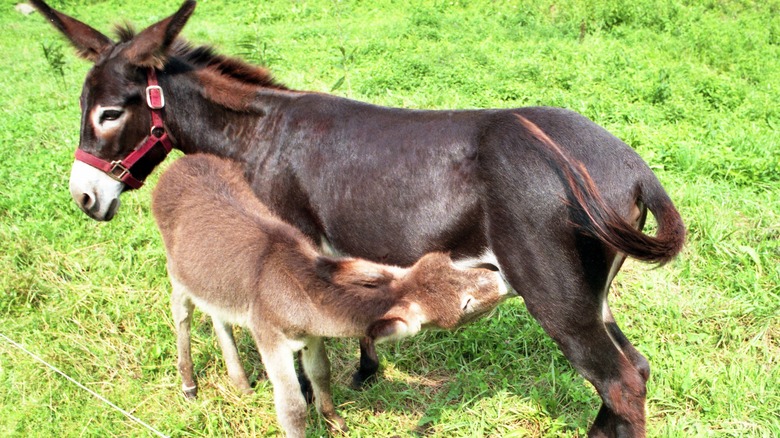The World's Most Expensive Milk Isn't From A Cow, Sheep, Or Goat
When it comes to rare and pricey food products, you might think of things like white truffles, saffron, Ibérico ham from Spain, and other splurge-worthy grocery store items you should try at least once. But on the dairy side of the spectrum, there's an unusual milk that is the most expensive in the world — and it doesn't come from a cow, a sheep, or a goat. This scarce and valuable product comes from a donkey.
Donkey milk is the costliest on Earth. Prices can vary, but to give an idea, one company that sells it in the U.S. charges $169.99 for 400 grams (just over 14 ounces) of powdered donkey milk and $7,999 for 20 kilos (just over 44 pounds). Another company offering imported donkey milk in the U.S. charges $59 for 3.53 ounces of pasteurized, freeze-dried product. The high cost is due to the difficulty of acquiring the milk, production limits and costs, and its desirability as an ingredient in luxury beauty products.
In contrast with a cow, which can produce up to 12 gallons of milk or more each day, a female donkey — known as a jenny — can only produce about 1 to 1 ½ liters of milk per day, which is less than half a gallon. And it can't all be commercially harvested — half or more must go to feeding the donkey's foal. Unlike cows, whose young are removed very early so total milk production can be utilized for human use, a jenny's foal must be present for milk to be released by the mother. Obtaining the milk is also very labor intensive, as jennies are milked every three hours and have smaller teats, making the process more difficult.
Donkey milk: uses and uniqueness
As a culinary ingredient, donkey milk has many attractive properties that might woo a chef into paying the premium price. Milder than cow's milk, subtly sweet, and less creamy, donkey's milk also has a finer texture than its bovine counterpart, making it optimal for dishes that are on the lighter side. These qualities lend versatility, as well, making it useful in both savory and sweet recipes. And a donkey's milk isn't its only costly offering. Cheese made from donkey milk, called pule, is also the most expensive in the world.
Donkey's milk is attractive from a nutritional perspective, too. It's lower in fat and calories than other milks, has higher vitamin D content, and is replete with vitamins, minerals, and proteins. The product has been labeled a "pharma food," because it's been shown in studies to have immunity-boosting and inflammation-reducing properties, among other potential benefits.
Some other interesting facts adding to the uniqueness of donkey milk are that it is the closest in composition to human breast milk of any known natural milk on Earth, and it's been used for well over 100 years as an alternative for orphaned infants. The similarity to human milk also makes it a well-known option for children with cow's milk protein allergy.


